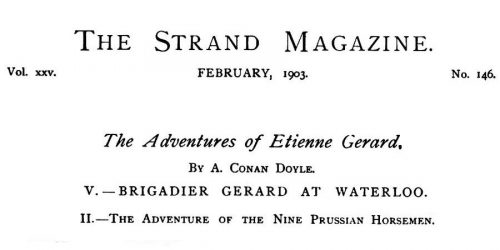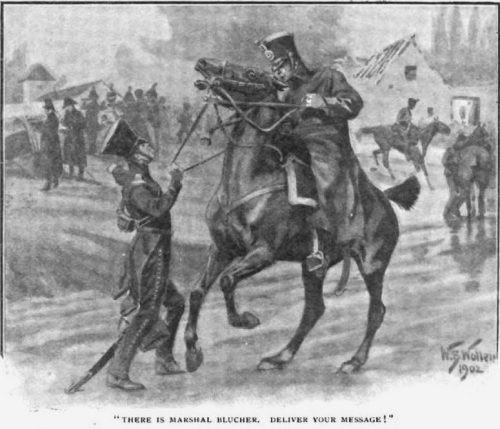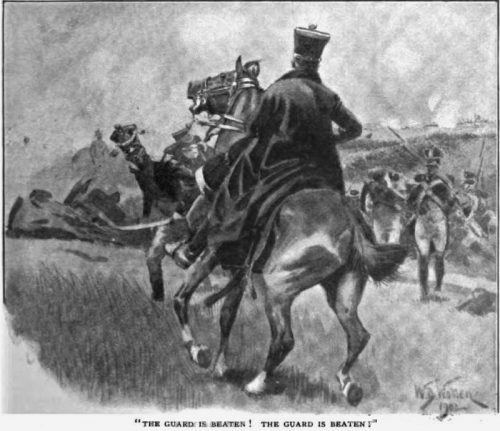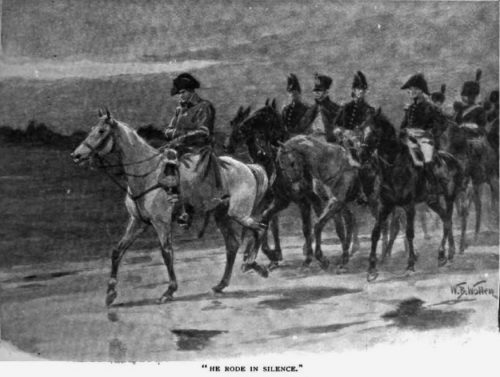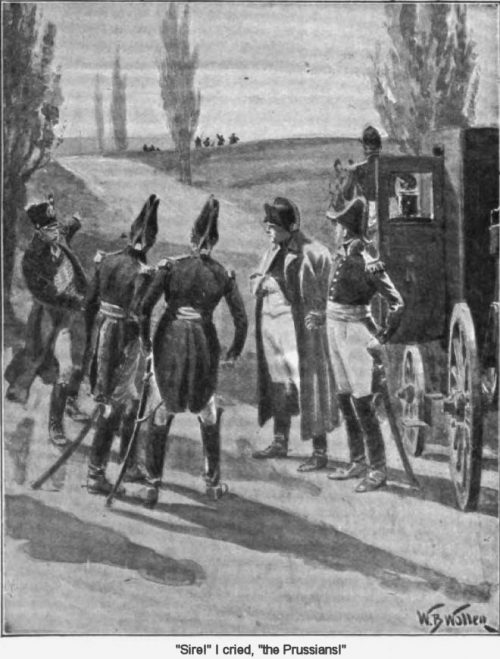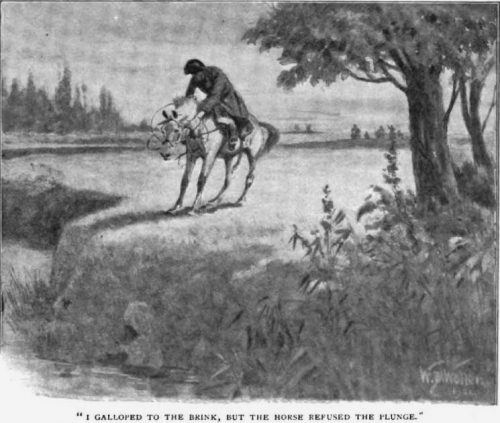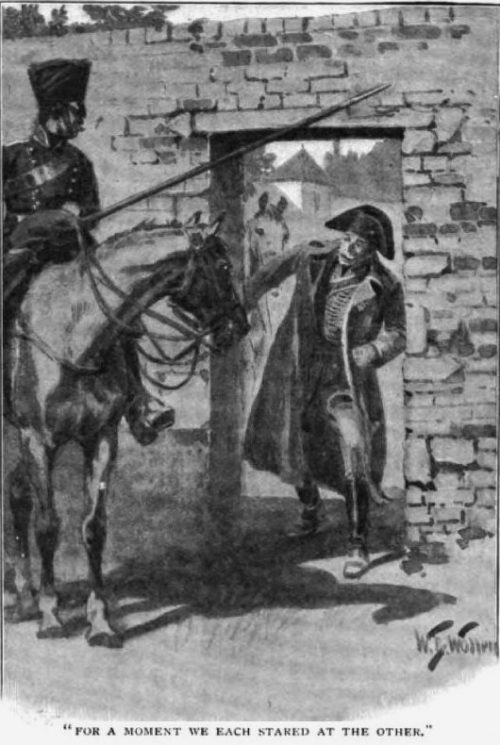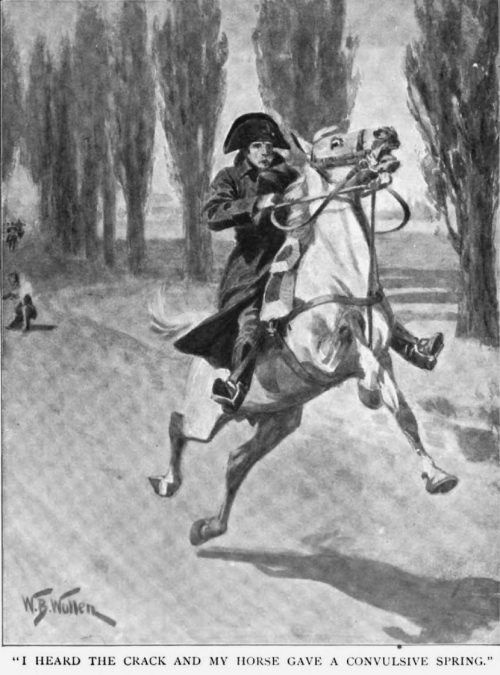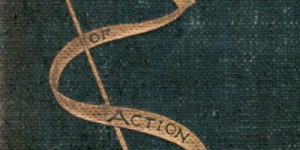How the Brigadier Bore Himself at Waterloo: II. The Story Of The Nine Prussian Horsemen : The Adventures of Brigadier Gerard by Arthur Conan Doyle
How the Brigadier Bore Himself at Waterloo: II. The Story Of The Nine Prussian Horsemen
by
Sir Arthur Conan Doyle
First published in The Strand Magazine, February 1903
First book appearance in The Adventures Of Brigadier Gerard, 1903
With illustrations by William Barnes Wollen
Brigadier Gerard Story XIV. How the Brigadier Bore Himself at Waterloo: II. The Story Of The Nine Prussian Horsemen
I told you when last we met, my friends, of the important mission from the Emperor to Marshal Grouchy, which failed through no fault of my own, and I described to you how during a long afternoon I was shut up in the attic of a country inn, and was prevented from coming out because the Prussians were all around me. You will remember also how I overheard the Chief of the Prussian Staff give his instructions to Count Stein, and so learned the dangerous plan which was on foot to kill or capture the Emperor in the event of a French defeat. At first I could not have believed in such a thing, but since the guns had thundered all day, and since the sound had made no advance in my direction, it was evident that the English had at least held their own and beaten off all our attacks.
I have said that it was a fight that day between the soul of France and the beef of England, but it must be confessed that we found the beef was very tough. It was clear that if the Emperor could not defeat the English when alone, then it might, indeed, go hard with him now that sixty thousand of these cursed Prussians were swarming on his flank. In any case, with this secret in my possession, my place was by his side.
I had made my way out of the inn in the dashing manner which I have described to you when last we met, and I left the English aide-de-camp shaking his foolish fist out of the window. I could not but laugh as I looked back at him, for his angry red face was framed and frilled with hay. Once out on the road I stood erect in my stirrups, and I put on the handsome black riding-coat, lined with red, which had belonged to him. It fell to the top of my high boots, and covered my tell-tale uniform completely. As to my busby, there are many such in the German service, and there was no reason why it should attract attention. So long as no one spoke to me there was no reason why I should not ride through the whole of the Prussian army; but though I understood German, for I had many friends among the German ladies during the pleasant years that I fought all over that country, still I spoke it with a pretty Parisian accent which could not be confounded with their rough, unmusical speech. I knew that this quality of my accent would attract attention, but I could only hope and pray that I would be permitted to go my way in silence.
The Forest of Paris was so large that it was useless to think of going round it, and so I took my courage in both hands and galloped on down the road in the track of the Prussian army. It was not hard to trace it, for it was rutted two feet deep by the gun-wheels and the caissons. Soon I found a fringe of wounded men, Prussians and French, on each side of it, where Bulow’s advance had come into touch with Marbot’s Hussars. One old man with a long white beard, a surgeon, I suppose, shouted at me, and ran after me still shouting, but I never turned my head and took no notice of him save to spur on faster. I heard his shouts long after I had lost sight of him among the trees.
Presently I came up with the Prussian reserves. The infantry were leaning on their muskets or lying exhausted on the wet ground, and the officers stood in groups listening to the mighty roar of the battle and discussing the reports which came from the front. I hurried past at the top of my speed, but one of them rushed out and stood in my path with his hand up as a signal to me to stop. Five thousand Prussian eyes were turned upon me. There was a moment! You turn pale, my friends, at the thought of it. Think how every hair upon me stood on end. But never for one instant did my wits or my courage desert me. “General Blucher!” I cried. Was it not my guardian angel who whispered the words in my ear? The Prussian sprang from my path, saluted, and pointed forward. They are well disciplined, these Prussians, and who was he that he should dare to stop the officer who bore a message to the general?
It was a talisman that would pass me out of every danger, and my heart sang within me at the thought. So elated was I that I no longer waited to be asked, but as I rode through the army I shouted to right and left,
“General Blucher! General Blucher!” and every man pointed me onward and cleared a path to let me pass.
There are times when the most supreme impudence is the highest wisdom. But discretion must also be used, and I must admit that I became indiscreet. For as I rode upon my way, ever nearer to the fighting line, a Prussian officer of Uhlans gripped my bridle and pointed to a group of men who stood near a burning farm. “There is Marshal Blucher. Deliver your message!” said he, and sure enough, my terrible old grey-whiskered veteran was there within a pistol-shot, his eyes turned in my direction.
But the good guardian angel did not desert me.
Quick as a flash there came into my memory the name of the general who commanded the advance of the Prussians.
“General Bulow!” I cried. The Uhlan let go my bridle. “General Bulow! General Bulow!” I shouted, as every stride of the dear little mare took me nearer my own people. Through the burning village of Planchenoit I galloped, spurred my way between two columns of Prussian infantry, sprang over a hedge, cut down a Silesian Hussar who flung himself before me, and an instant afterward, with my coat flying open to show the uniform below, I passed through the open files of the tenth of the line, and was back in the heart of Lobau’s corps once more. Outnumbered and outflanked, they were being slowly driven in by the pressure of the Prussian advance. I galloped onward, anxious only to find myself by the Emperor’s side.
But a sight lay before me which held me fast as though I had been turned into some noble equestrian statue. I could not move, I could scarce breathe, as I gazed upon it. There was a mound over which my path lay, and as I came out on the top of it I looked down the long, shallow valley of Waterloo. I had left it with two great armies on either side and a clear field between them. Now there were but long, ragged fringes of broken and exhausted regiments upon the two ridges, but a real army of dead and wounded lay between. For two miles in length and half a mile across the ground was strewed and heaped with them. But slaughter was no new sight to me, and it was not that which held me spellbound. It was that up the long slope of the British position was moving a walking forest-black, tossing, waving, unbroken. Did I not know the bearskins of the Guard? And did I not also know, did not my soldier’s instinct tell me, that it was the last reserve of France; that the Emperor, like a desperate gamester, was staking all upon his last card? Up they went and up—grand, solid, unbreakable, scourged with musketry, riddled with grape, flowing onward in a black, heavy tide, which lapped over the British batteries. With my glass I could see the English gunners throw themselves under their pieces or run to the rear. On rolled the crest of the bearskins, and then, with a crash which was swept across to my ears, they met the British infantry. A minute passed, and another, and another. My heart was in my mouth.
They swayed back and forward; they no longer advanced; they were held. Great Heaven! was it possible that they were breaking? One black dot ran down the hill, then two, then four, then ten, then a great, scattered, struggling mass, halting, breaking, halting, and at last shredding out and rushing madly downward.
“The Guard is beaten! The Guard is beaten!” From all around me I heard the cry. Along the whole line the infantry turned their faces and the gunners flinched from their guns.
“The Old Guard is beaten! The Guard retreats!” An officer with a livid face passed me yelling out these words of woe. “Save yourselves! Save yourselves! You are betrayed!” cried another. “Save yourselves! Save yourselves!” Men were rushing madly to the rear, blundering and jumping like frightened sheep. Cries and screams rose from all around me. And at that moment, as I looked at the British position, I saw what I can never forget. A single horseman stood out black and clear upon the ridge against the last red angry glow of the setting sun. So dark, so motionless, against that grim light, he might have been the very spirit of Battle brooding over that terrible valley. As I gazed, he raised his hat high in the air, and at the signal, with a low, deep roar like a breaking wave, the whole British army flooded over their ridge and came rolling down into the valley.
Long steel-fringed lines of red and blue, sweeping waves of cavalry, horse batteries rattling and bounding—down they came on to our crumbling ranks. It was over. A yell of agony, the agony of brave men who see no hope, rose from one flank to the other, and in an instant the whole of that noble army was swept in a wild, terror-stricken crowd from the field. Even now, dear friends, I cannot, as you see, speak of that dreadful moment with a dry eye or with a steady voice.
At first I was carried away in that wild rush, whirled off like a straw in a flooded gutter. But, suddenly, what should I see amongst the mixed regiments in front of me but a group of stern horsemen, in silver and grey, with a broken and tattered standard held aloft in the heart of them! Not all the might of England and of Prussia could break the Hussars of Conflans. But when I joined them it made my heart bleed to see them. The major, seven captains, and five hundred men were left upon the field. Young Captain Sabbatier was in command, and when I asked him where were the five missing squadrons he pointed back and answered: “You will find them round one of those British squares.” Men and horses were at their last gasp, caked with sweat and dirt, their black tongues hanging out from their lips; but it made me thrill with pride to see how that shattered remnant still rode knee to knee, with every man, from the boy trumpeter to the farrier-sergeant, in his own proper place.
Would that I could have brought them on with me as an escort for the Emperor! In the heart of the Hussars of Conflans he would be safe indeed. But the horses were too spent to trot. I left them behind me with orders to rally upon the farm-house of St. Aunay, where we had camped two nights before. For my own part, I forced my horse through the throng in search of the Emperor.
There were things which I saw then, as I pressed through that dreadful crowd, which can never be banished from my mind. In evil dreams there comes back to me the memory of that flowing stream of livid, staring, screaming faces upon which I looked down. It was a nightmare. In victory one does not understand the horror of war. It is only in the cold chill of defeat that it is brought home to you. I remember an old Grenadier of the Guard lying at the side of the road with his broken leg doubled at a right angle. “Comrades, comrades, keep off my leg!” he cried, but they tripped and stumbled over him all the same. In front of me rode a Lancer officer without his coat. His arm had just been taken off in the ambulance. The bandages had fallen. It was horrible. Two gunners tried to drive through with their gun. A Chasseur raised his musket and shot one of them through the head. I saw a major of Cuirassiers draw his two holster pistols and shoot first his horse and then himself. Beside the road a man in a blue coat was raging and raving like a madman. His face was black with powder, his clothes were torn, one epaulette was gone, the other hung dangling over his breast. Only when I came close to him did I recognise that it was Marshal Ney. He howled at the flying troops and his voice was hardly human. Then he raised the stump of his sword— it was broken three inches from the hilt. “Come and see how a Marshal of France can die!” he cried. Gladly would I have gone with him, but my duty lay elsewhere.
He did not, as you know, find the death he sought, but he met it a few weeks later in cold blood at the hands of his enemies.
There is an old proverb that in attack the French are more than men, in defeat they are less than women. I knew that it was true that day. But even in that rout I saw things which I can tell with pride. Through the fields which skirt the road moved Cambronne’s three reserve battalions of the Guard, the cream of our army.
They walked slowly in square, their colours waving over the sombre line of the bearskins. All round them raged the English cavalry and the black Lancers of Brunswick, wave after wave thundering up, breaking with a crash, and recoiling in ruin. When last I saw them, the English guns, six at a time, were smashing grape-shot through their ranks and the English infantry were closing in upon three sides and pouring volleys into them; but still, like a noble lion with fierce hounds clinging to its flanks, the glorious remnant of the Guard, marching slowly, halting, closing up, dressing, moved majestically from their last battle. Behind them the Guard’s battery of twelve-pounders was drawn up upon the ridge. Every gunner was in his place, but no gun fired. “Why do you not fire?” I asked the colonel as I passed. “Our powder is finished.” “Then why not retire?” “Our appearance may hold them back for a little. We must give the Emperor time to escape.” Such were the soldiers of France.
Behind this screen of brave men the others took their breath, and then went on in less desperate fashion. They had broken away from the road, and all over the countryside in the twilight I could see the timid, scattered, frightened crowd who ten hours before had formed the finest army that ever went down to battle. I with my splendid mare was soon able to get clear of the throng, and just after I passed Genappe I overtook the Emperor with the remains of his Staff. Soult was with him still, and so were Drouot, Lobau, and Bertrand, with five Chasseurs of the Guard, their horses hardly able to move.
The night was falling, and the Emperor’s haggard face gleamed white through the gloom as he turned it toward me.
“Who is that?” he asked.
“It is Colonel Gerard,” said Soult.
“Have you seen Marshal Grouchy?”
“No, Sire. The Prussians were between.”
“It does not matter. Nothing matters now. Soult, I will go back.”
He tried to turn his horse, but Bertrand seized his bridle. “Ah, Sire,” said Soult, “the enemy has had good fortune enough already.” They forced him on among them.
He rode in silence with his chin upon his breast, the greatest and the saddest of men. Far away behind us those remorseless guns were still roaring. Sometimes out of the darkness would come shrieks and screams and the low thunder of galloping hoofs. At the sound we would spur our horses and hasten onward through the scattered troops. At last, after riding all night in the clear moonlight, we found that we had left both pursued and pursuers behind. By the time we passed over the bridge at Charleroi the dawn was breaking. What a company of spectres we looked in that cold, clear, searching light, the Emperor with his face of wax, Soult blotched with powder, Lobau dabbled with blood! But we rode more easily now, and had ceased to glance over our shoulders, for Waterloo was more than thirty miles behind us. One of the Emperor’s carriages had been picked up at Charleroi, and we halted now on the other side of the Sambre, and dismounted from our horses.
You will ask me why it was that during all this time I had said nothing of that which was nearest my heart, the need for guarding the Emperor. As a fact, I had tried to speak of it both to Soult and to Lobau, but their minds were so overwhelmed with the disaster and so distracted by the pressing needs of the moment that it was impossible to make them understand how urgent was my message. Besides, during this long flight we had always had numbers of French fugitives beside us on the road, and, however demoralised they might be, we had nothing to fear from the attack of nine men. But now, as we stood round the Emperor’s carriage in the early morning, I observed with anxiety that not a single French soldier was to be seen upon the long, white road behind us. We had outstripped the army. I looked round to see what means of defence were left to us. The horses of the Chasseurs of the Guard had broken down, and only one of them, a grey-whiskered sergeant, remained.
There were Soult, Lobau, and Bertrand; but, for all their talents, I had rather, when it came to hard knocks, have a single quartermaster-sergeant of Hussars at my side than the three of them put together. There remained the Emperor himself, the coachman, and a valet of the household who had joined us at Charleroi—eight all told; but of the eight only two, the Chasseur and I, were fighting soldiers who could be depended upon at a pinch. A chill came over me as I reflected how utterly helpless we were. At that moment I raised my eyes, and there were the nine Prussian horsemen coming over the hill.
On either side of the road at this point are long stretches of rolling plain, part of it yellow with corn and part of it rich grass land watered by the Sambre. To the south of us was a low ridge, over which was the road to France. Along this road the little group of cavalry was riding. So well had Count Stein obeyed his instructions that he had struck far to the south of us in his determination to get ahead of the Emperor. Now he was riding from the direction in which we were going—the last in which we could expect an enemy. When I caught that first glimpse of them they were still half a mile away.
“Sire!” I cried, “the Prussians!”
They all started and stared. It was the Emperor who broke the silence.
“Who says they are Prussians?”
“I do, Sire—I, Etienne Gerard!”
Unpleasant news always made the Emperor furious against the man who broke it. He railed at me now in the rasping, croaking, Corsican voice which only made itself heard when he had lost his self-control.
“You were always a buffoon,” he cried. “What do you mean, you numskull, by saying that they are Prussians?
How could Prussians be coming from the direction of France? You have lost any wits that you ever possessed.”
His words cut me like a whip, and yet we all felt toward the Emperor as an old dog does to its master.
His kick is soon forgotten and forgiven. I would not argue or justify myself. At the first glance I had seen the two white stockings on the forelegs of the leading horse, and I knew well that Count Stein was on its back.
For an instant the nine horsemen had halted and surveyed us. Now they put spurs to their horses, and with a yell of triumph they galloped down the road. They had recognised that their prey was in their power.
At that swift advance all doubt had vanished. “By heavens, Sire, it is indeed the Prussians!” cried Soult.
Lobau and Bertrand ran about the road like two frightened hens. The sergeant of Chasseurs drew his sabre with a volley of curses. The coachman and the valet cried and wrung their hands. Napoleon stood with a frozen face, one foot on the step of the carriage. And I—ah, my friends, I was magnificent! What words can I use to do justice to my own bearing at that supreme instant of my life? So coldly alert, so deadly cool, so clear in brain and ready in hand. He had called me a numskull and a buffoon. How quick and how noble was my revenge! When his own wits failed him, it was Etienne Gerard who supplied the want.
To fight was absurd; to fly was ridiculous. The Emperor was stout, and weary to death. At the best he was never a good rider. How could he fly from these, the picked men of an army? The best horseman in Prussia was among them. But I was the best horseman in France. I, and only I, could hold my own with them. If they were on my track instead of the Emperor’s, all might still be well. These were the thoughts which flashed so swiftly through my mind that in an instant I had sprung from the first idea to the final conclusion. Another instant carried me from the final conclusion to prompt and vigorous action. I rushed to the side of the Emperor, who stood petrified, with the carriage between him and our enemies. “Your coat, Sire! your hat!” I cried. I dragged them of him.
Never had he been so hustled in his life. In an instant I had them on and had thrust him into the carriage. The next I had sprung on to his famous white Arab and had ridden clear of the group upon the road.
You have already divined my plan; but you may well ask how could I hope to pass myself off as the Emperor.
My figure is as you still see it, and his was never beautiful, for he was both short and stout. But a man’s height is not remarked when he is in the saddle, and for the rest one had but to sit forward on the horse and round one’s back and carry oneself like a sack of flour. I wore the little cocked hat and the loose grey coat with the silver star which was known to every child from one end of Europe to the other. Beneath me was the Emperor’s own famous white charger. It was complete.
Already as I rode clear the Prussians were within two hundred yards of us. I made a gesture of terror and despair with my hands, and I sprang my horse over the bank which lined the road. It was enough. A yell of exultation and of furious hatred broke from the Prussians.
It was the howl of starving wolves who scent their prey. I spurred my horse over the meadow-land and looked back under my arm as I rode. Oh, the glorious moment when one after the other I saw eight horsemen come over the bank at my heels! Only one had stayed behind, and I heard shouting and the sounds of a struggle. I remembered my old sergeant of Chasseurs, and I was sure that number nine would trouble us no more. The road was clear and the Emperor free to continue his journey.
But now I had to think of myself. If I were overtaken the Prussians would certainly make short work of me in their disappointment. If it were so —if I lost my life—I should still have sold it at a glorious price. But I had hopes that I might shake them off. With ordinary horsemen upon ordinary horses I should have had no difficulty in doing so, but here both steeds and riders were of the best. It was a grand creature that I rode, but it was weary with its long night’s work, and the Emperor was one of those riders who do not know how to manage a horse. He had little thought far them and a heavy hand upon their mouths. On the other hand, Stein and his men had come both far and fast. The race was a fair one.
So quick had been my impulse, and so rapidly had I acted upon it, that I had not thought enough of my own safety. Had I done so in the first instance I should, of course, have ridden straight back the way we had come, for so I should have met our own people. But I was off the road and had galloped a mile over the plain before this occurred to me. Then when I looked back I saw that the Prussians had spread out into a long line, so as to head me off from the Charleroi road. I could not turn back, but at least I could edge toward the north. I knew that the whole face of the country was covered with our flying troops, and that sooner or later I must come upon some of them.
But one thing I had forgotten—the Sambre. In my excitement I never gave it a thought until I saw it, deep and broad, gleaming in the morning sunlight. It barred my path, and the Prussians howled behind me. I galloped to the brink, but the horse refused the plunge. I spurred him, but the bank was high and the stream deep.
He shrank back trembling and snorting. The yells of triumph were louder every instant. I turned and rode for my life down the river bank. It formed a loop at this part, and I must get across somehow, for my retreat was blocked. Suddenly a thrill of hope ran through me, for I saw a house on my side of the stream and another on the farther bank. Where there are two such houses it usually means that there is a ford between them. A sloping path led to the brink and I urged my horse down it. On he went, the water up to the saddle, the foam flying right and left. He blundered once and I thought we were lost, but he recovered and an instant later was clattering up the farther slope. As we came out I heard the splash behind me as the first Prussian took the water. There was just the breadth of the Sambre between us.
I rode with my head sunk between my shoulders in Napoleon’s fashion, and I did not dare to look back for fear they should see my moustache. I had turned up the collar of the grey coat so as partly to hide it. Even now if they found out their mistake they might turn and overtake the carriage. But when once we were on the road I could tell by the drumming of their hoofs how far distant they were, and it seemed to me that the sound grew perceptibly louder, as if they were slowly gaining upon me. We were riding now up the stony and rutted lane which led from the ford. I peeped back very cautiously from under my arm and I perceived that my danger came from a single rider, who was far ahead of his comrades.
He was a Hussar, a very tiny fellow, upon a big black horse, and it was his light weight which had brought him into the foremost place. It is a place of honour; but it is also a place of danger, as he was soon to learn. I felt the holsters, but, to my horror, there were no pistols. There was a field-glass in one and the other was stuffed with papers. My sword had been left behind with Violette.
Had I only my own weapons and my own little mare I could have played with these rascals. But I was not entirely unarmed. The Emperor’s own sword hung to the saddle. It was curved and short, the hilt all crusted with gold —a thing more fitted to glitter at a review than to serve a soldier in his deadly need. I drew it, such as it was, and I waited my chance. Every instant the clink and clatter of the hoofs grew nearer. I heard the panting of the horse, and the fellow shouted some threat at me. There was a turn in the lane, and as I rounded it I drew up my white Arab on his haunches. As we spun round I met the Prussian Hussar face to face. He was going too fast to stop, and his only chance was to ride me down. Had he done so he might have met his own death, but he would have injured me or my horse past all hope of escape. But the fool flinched as he saw me waiting and flew past me on my right. I lunged over my Arab’s neck and buried my toy sword in his side. It must have been the finest steel and as sharp as a razor, for I hardly felt it enter, and yet his blood was within three inches of the hilt. His horse galloped on and he kept his saddle for a hundred yards before he sank down with his face on the mane and then dived over the side of the neck on to the road. For my own part I was already at his horse’s heels. A few seconds had sufficed for all that I have told.
I heard the cry of rage and vengeance which rose from the Prussians as they passed their dead comrade, and I could not but smile as I wondered what they could think of the Emperor as a horseman and a swordsman. I glanced back cautiously as before, and I saw that none of the seven men stopped. The fate of their comrade was nothing compared to the carrying out of their mission.
They were as untiring and as remorseless as bloodhounds.
But I had a good lead and the brave Arab was still going well. I thought that I was safe. And yet it was at that very instant that the most terrible danger befell me. The lane divided, and I took the smaller of the two divisions because it was the more grassy and the easier for the horse’s hoofs. Imagine my horror when, riding through a gate, I found myself in a square of stables and farm-buildings, with no way out save that by which I had come! Ah, my friends, if my hair is snowy white, have I not had enough to make it so?
To retreat was impossible. I could hear the thunder of the Prussians’ hoofs in the lane. I looked round me, and Nature has blessed me with that quick eye which is the first of gifts to any soldier, but most of all to a leader of cavalry. Between a long, low line of stables and the farm-house there was a pig-sty. Its front was made of bars of wood four feet high; the back was of stone, higher than the front. What was beyond I could not tell. The space between the front and the back was not more than a few yards. It was a desperate venture, and yet I must take it. Every instant the beating of those hurrying hoofs was louder and louder. I put my Arab at the pig-sty. She cleared the front beautifully and came down with her forefeet upon the sleeping pig within, slipping forward upon her knees. I was thrown over the wall beyond, and fell upon my hands and face in a soft flower-bed. My horse was upon one side of the wall, I upon the other, and the Prussians were pouring into the yard. But I was up in an instant and had seized the bridle of the plunging horse over the top of the wall. It was built of loose stones, and I dragged down a few of them to make a gap. As I tugged at the bridle and shouted the gallant creature rose to the leap, and an instant afterward she was by my side and I with my foot on the stirrup.
An heroic idea had entered my mind as I mounted into the saddle. These Prussians, if they came over the pig-sty, could only come one at once, and their attack would not be formidable when they had not had time to recover from such a leap. Why should I not wait and kill them one by one as they came over? It was a glorious thought. They would learn that Etienne Gerard was not a safe man to hunt. My hand felt for my sword, but you can imagine my feelings, my friends, when I came upon an empty scabbard. It had been shaken out when the horse had tripped over that infernal pig. On what absurd trifles do our destinies hang—a pig on one side, Etienne Gerard on the other! Could I spring over the wall and get the sword? Impossible! The Prussians were already in the yard. I turned my Arab and resumed my flight.
But for a moment it seemed to me that I was in a far worse trap than before. I found myself in the garden of the farm-house, an orchard in the centre and flower-beds all round. A high wall surrounded the whole place. I reflected, however, that there must be some point of entrance, since every visitor could not be expected to spring over the pig-sty. I rode round the wall. As I expected, I came upon a door with a key upon the inner side. I dismounted, unlocked it, opened it, and there was a Prussian Lancer sitting his horse within six feet of me.
For a moment we each stared at the other. Then I shut the door and locked it again. A crash and a cry came from the other end of the garden. I understood that one of my enemies had come to grief in trying to get over the pig-sty. How could I ever get out of this cul-de-sac? It was evident that some of the party had galloped round, while some had followed straight upon my tracks. Had I my sword I might have beaten off the Lancer at the door, but to come out now was to be butchered. And yet if I waited some of them would certainly follow me on foot over the pig-sty, and what could I do then? I must act at once or I was lost. But it is at such moments that my wits are most active and my actions most prompt. Still leading my horse, I ran for a hundred yards by the side of the wall away from the spot where the Lancer was watching. There I stopped, and with an effort I tumbled down several of the loose stones from the top of the wall. The instant I had done so I hurried back to the door. As I had expected, he thought I was making a gap for my escape at that point, and I heard the thud of his horse’s hoofs as he galloped to cut me off. As I reached the gate I looked back, and I saw a green-coated horseman, whom I knew to be Count Stein, clear the pig-sty and gallop furiously with a shout of triumph across the garden.
“Surrender, your Majesty, surrender!” he yelled; “we will give you quarter!” I slipped through the gate, but had no time to lock it on the other side. Stein was at my very heels, and the Lancer had already turned his horse. Springing upon my Arab’s back, I was off once more with a clear stretch of grass land before me. Stein had to dismount to open the gate, to lead his horse through, and to mount again before he could follow.
It was he that I feared rather than the Lancer, whose horse was coarse- bred and weary. I galloped hard for a mile before I ventured to look back, and then Stein was a musket-shot from me, and the Lancer as much again, while only three of the others were in sight. My nine Prussians were coming down to more manageable numbers, and yet one was too much for an unarmed man.
It had surprised me that during this long chase I had seen no fugitives from the army, but I reflected that I was considerably to the west of their line of flight, and that I must edge more toward the east if I wished to join them. Unless I did so it was probable that my pursuers, even if they could not overtake me themselves, would keep me in view until I was headed off by some of their comrades coming from the north. As I looked to the eastward I saw afar off a line of dust which stretched for miles across the country. This was certainly the main road along which our unhappy army was flying. But I soon had proof that some of our stragglers had wandered into these side tracks, for I came suddenly upon a horse grazing at the corner of a field, and beside him, with his back against the bank, his master, a French Cuirassier, terribly wounded and evidently on the point of death. I sprang down, seized his long, heavy sword, and rode on with it. Never shall I forget the poor man’s face as he looked at me with his failing sight. He was an old, grey-moustached soldier, one of the real fanatics, and to him this last vision of his Emperor was like a revelation from on high.
Astonishment, love, pride—all shone in his pallid face. He said something—I fear they were his last words—but I had no time to listen, and I galloped on my way.
All this time I had been on the meadow-land, which was intersected in this part by broad ditches. Some of them could not have been less than from fourteen to fifteen feet, and my heart was in my mouth as I went at each of them, for a slip would have been my ruin.
But whoever selected the Emperor’s horses had done his work well. The creature, save when it balked on the bank of the Sambre, never failed me for an instant.
We cleared everything in one stride. And yet we could not shake off! those infernal Prussians. As I left each water-course behind me I looked back with renewed hope; but it was only to see Stein on his white-legged chestnut flying over it as lightly as I had done myself. He was my enemy, but I honoured him for the way in which he carried himself that day.
Again and again I measured the distance which separated him from the next horseman. I had the idea that I might turn and cut him down, as I had the Hussar, before his comrade could come to his help. But the others had closed up and ere not far behind. I reflected that this Stein was probably as fine a swordsman as he was a rider, and that it might take me some little time to get the better of him. In that case the others would come to his aid an I should be lost. On the whole, it was wiser to continue my flight.
A road with poplars on either side ran across the plain from east to west. It would lead me toward that long line of dust which marked the French retreat. I wheeled my horse, therefore, and galloped down it. As I rode I saw a single house in front of me upon the right, with a great bush hung over the door to mark it as an inn. Outside there were several peasants, but for them I cared nothing. What frightened me was to see the gleam of a red coat, which showed that there were British in the place. However, I could not turn and I could not stop, so there was nothing for it but to gallop on and to take my chance. There were no troops in sight, so these men must be stragglers or marauders, from whom I had little to fear. As I approached I saw that there were two of them sitting drinking on a bench outside the inn door. I saw them stagger to their feet, and it was evident that they were both very drunk. One stood swaying in the middle of the road.
“It’s Boney! So help me, it’s Boney!” he yelled. He ran with his hands out to catch me, but luckily for himself his drunken feet stumbled and he fell on his face on the road. The other was more dangerous. He had rushed into the inn, and just as I passed I saw him run out with his musket in his hand. He dropped upon one knee, and I stooped forward over my horse’s neck.
A single shot from a Prussian or an Austrian is a small matter, but the British were at that time the best shots in Europe, and my drunkard seemed steady enough when he had a gun at his shoulder. I heard the crack, and my horse gave a convulsive spring which would have unseated many a rider. For an instant I thought he was killed, but when I turned in my saddle I saw a stream of blood running down the off hind-quarter. I looked back at the Englishman, and the brute had bitten the end off another cartridge and was ramming it into his musket, but before he had it primed we were beyond his range. These men were foot-soldiers and could not join in the chase, but I heard them whooping and tally-hoing behind me as if I had been a fox. The peasants also shouted and ran through the fields flourishing their sticks. From all sides I heard cries, and everywhere were the rushing, waving figures of my pursuers. To think of the great Emperor being chivvied over the country-side in this fashion! It made me long to have these rascals within the sweep of my sword.
But now I felt that I was nearing the end of my course. I had done all that a man could be expected to do—some would say more—but at last I had come to a point from which I could see no escape. The horses of my pursuers were exhausted, but mine was exhausted and wounded also. It was losing blood fast, and we left a red trail upon the white, dusty road. Already his pace was slackening, and sooner or later he must drop under me. I looked back, and there were the five inevitable Prussians—Stein a hundred yards in front, then a Lancer, and then three others riding together.
Stein had drawn his sword, and he waved it at me. For my own part I was determined not to give myself up.
I would try how many of these Prussians I could take with me into the other world. At this supreme moment all the great deeds of my life rose in a vision before me, and I felt that this, my last exploit, was indeed a worthy close to such a career. My death would be a fatal blow to those who loved me, to my dear mother, to my Hussars, to others who shall be nameless. But all of them had my honour and my fame at heart, and I felt that their grief would be tinged with pride when they learned how I had ridden and how I had fought upon this last day. Therefore I hardened my heart and, as my Arab limped more and more upon his wounded leg, I drew the great sword which I had taken from the Cuirassier, and I set my teeth for my supreme struggle. My hand was in the very act of tightening the bridle, for I feared that if I delayed longer I might find myself on foot fighting against five mounted men.
At that instant my eye fell upon something which brought hope to my heart and a shout of joy to my lips.
From a grove of trees in front of me there projected the steeple of a village church. But there could not be two steeples like that, for the corner of it had crumbled away or been struck by lightning, so that it was of a most fantastic shape. I had seen it only two daye{sic} before, and it was the church of the village of Gosselies. It was not the hope of reaching the village which set my heart singing with joy, but it was that I knew my ground now, and that farm-house not half a mile ahead, with its gable end sticking out from amid the trees, must be that very farm of St. Aunay where we had bivouacked, and which I had named to Captain Sabbatier as the rendezvous of the Hussars of Conflans. There they were, my little rascals, if I could but reach them. With every bound my horse grew weaker. Each instant the sound of the pursuit grew louder. I heard a gust of crackling German oaths at my very heels. A pistol bullet sighed in my ears. Spurring frantically and beating my poor Arab with the flat of my sword I kept him at the top of his speed. The open gate of the farm-yard lay before me. I saw the twinkle of steel within. Stein’s horse’s head was within ten yards of me as I thundered through.
“To me, comrades! To me!” I yelled. I heard a buzz as when the angry bees swarm from their nest. Then my splendid white Arab fell dead under me and I was hurled on to the cobble-stones of the yard, where I can remember no more.
Such was my last and most famous exploit, my dear friends, a story which rang through Europe and has made the name of Etienne Gerard famous in history.
Alas! that all my efforts could only give the Emperor a few weeks more liberty, since he surrendered upon the 15th of July to the English. But it was not my fault that he was not able to collect the forces still waiting for him in France, and to fight another Waterloo with a happier ending. Had others been as loyal as I was the history of the world might have been changed, the Emperor would have preserved his throne, and such a soldier as I would not have been left to spend his life in planting cabbages or to while away his old age telling stories in a café. You ask me about the fate of Stein and the Prussian horsemen! Of the three who dropped upon the way I know nothing. One you will remember that I killed. There remained five, three of whom were cut down by my Hussars, who, for the instant, were under the impression that it was indeed the Emperor whom they were defending. Stein was taken, slightly wounded, and so was one of the Uhlans. The truth was not told to them, for we thought it best that no news, or false news, should get about as to where the Emperor was, so that Count Stein still believed that he was within a few yards of making that tremendous capture. “You may well love and honour your Emperor,” said he, “for such a horseman and such a swordsman I have never seen.” He could not understand why the young colonel of Hussars laughed so heartily at his words—but he has learned since.
How the Brigadier Bore Himself at Waterloo: I. The Story Of The Forest Inn
How the Brigadier Bore Himself at Waterloo: II. The Story Of The Nine Prussian Horsemen

